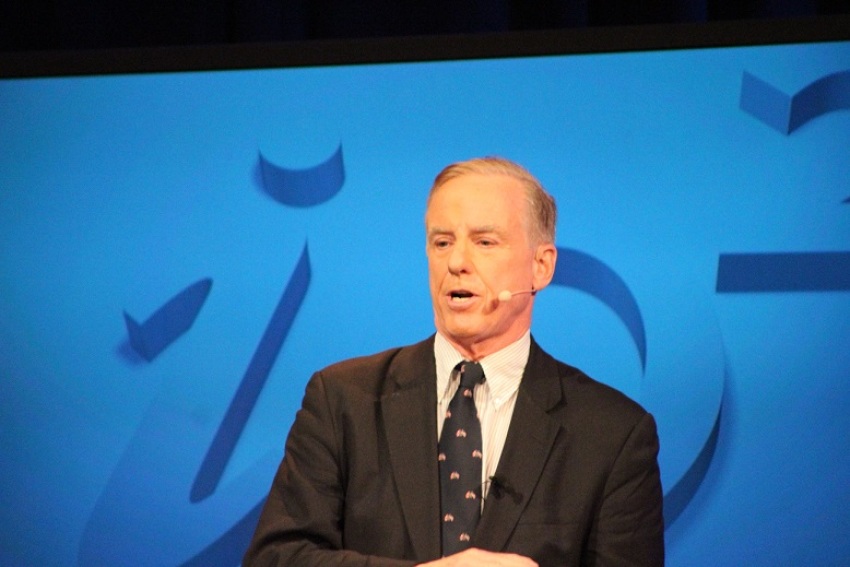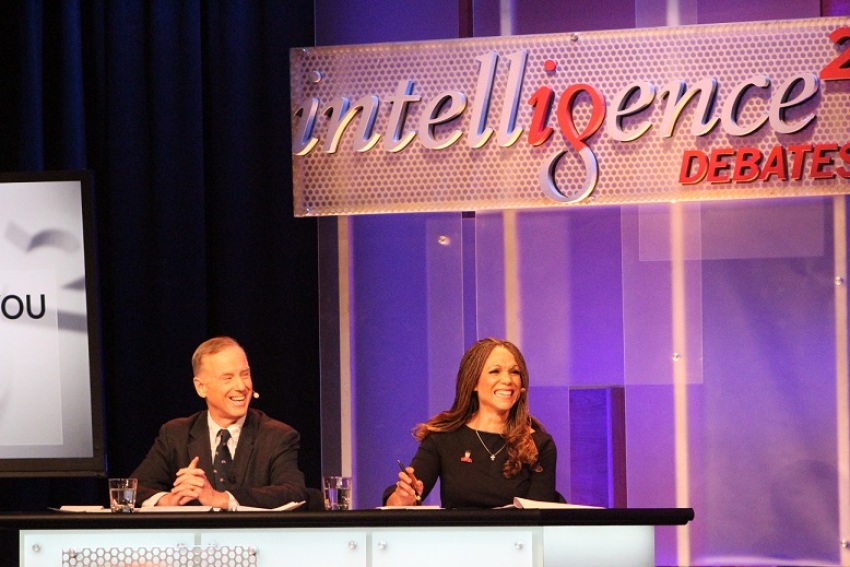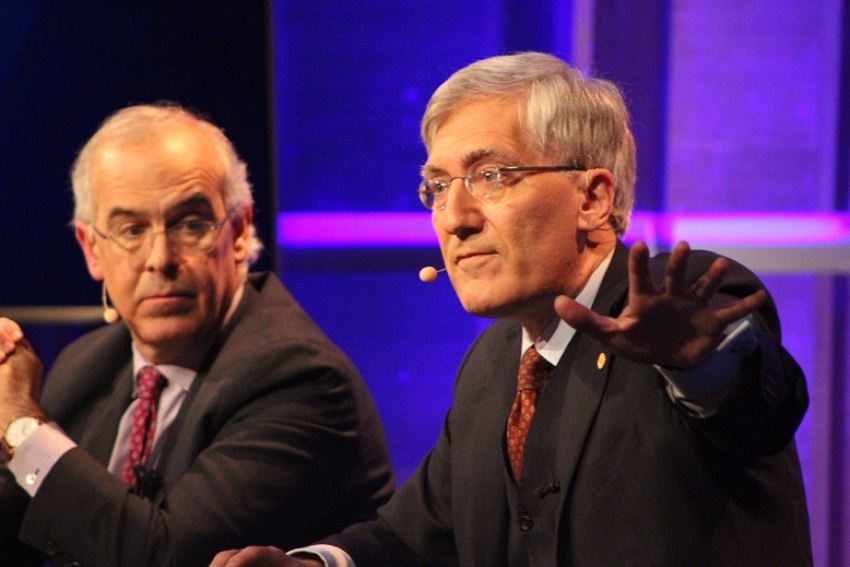Howard Dean Quotes Jesus in Slamming Conservatives on Tax Bill, Roy Moore

NEW YORK — Former chairman of the Democratic National Committee and six-term governor of Vermont, Howard Dean, quoted Scripture Thursday in slamming the Tax Cuts and Jobs Act of 2017 and conservatives who continue to support embattled Alabama Republican Senate candidate Roy Moore.
"This tax bill is an abomination. Jesus said that 'it is easier for a camel to pass through the eye of the needle than it is for a rich man to enter into the kingdom of Heaven,'" Dean argued in making his case that liberals hold the moral high ground over conservatives at an Intelligence Squared U.S. debate at the Kaufman Center.
"Now, did Jesus think that rich men were all terrible? No. I don't think He did. What He thought was that those people who have power, and money is power, have an easier time deluding themselves to believe that they are moral — morally superior than ordinary people who have to get up and work for a living every single day," he said.
Early Saturday morning the Republican controlled Senate passed the most comprehensive tax rewrite in decades that is expected to benefit most taxpayers, especially high-earning Americans.
"The tax bill is a deed. It is not a philosophy. It is a deed that is going to affect every American. And the people who are benefiting from that tax bill are the people who already have more money than they ever will need in the rest of their lives," Dean argued. "And the people who are harmed are children whose insurance program is going to be taken away; are graduate students hoping one day to make a better world through education who are now going to be taxed on income that they never even see because it's tuition money that they don't actually get."
Dean, who was paired with Melissa Harris-Perry, Maya Angelou Presidential Chair at Wake Forest University, to argue in support of the statement "Liberals hold the moral high ground" debated with veteran New York Times op-ed columnist David Brooks and Robert P. George, McCormick Professor of Jurisprudence and director of the James Madison Program in American Ideals and Institutions at Princeton University.

Dean and Perry, who opened the debate, argued that while it would be "inadequate" to argue that a liberal individual is more moral than a conservative individual, the pursuit of Liberalism by liberals leads to more moral outcomes than the pursuit of Conservatism by conservatives.
"It has been true, historically, that the character associated with liberal persons or conservative persons may be inadequate — that is not our argument. Instead what we will argue is that the guiding framework, choices, beliefs, public policies, and historical trajectories and outcomes of Liberalism with a capital L, versus Conservatism with a capital C lead us, as a nation, to more moral outcomes when the folks who are in charge, occupying elected office or in leadership or positions of power are people who understand themselves to be liberals," Perry said.
She also defined American morality as "a civic religion that is laid out by our framers as an aspirational morality."
"The author and signatories of the Declaration of Independence in 1776 tell us that in writing and signing this document they are telling the world what American morality is. They are telling us that in this moment in 1776, as they separate from old King George, that it is their responsibility to tell the world why. And here is what they say:
'We hold these truths to be self-evident that all persons are created equal and endowed by their Creator with certain inalienable rights, among them are life, liberty and the pursuit of happiness,'" she said. "... It is an aspirational document but a moral one for certain. So we take this as the standard of American civic morality by which both liberalism and conservatism must be judged. Human freedom, meaningful equality, the cultivation of human flourishing, and substantive popular governance."

Brooks argued that empirical evidence does not support the notion that liberals are morally superior to conservatives. He also noted that holding such a position is dangerous and it's partly why President Donald Trump got elected.
"If you think you're morally superior to conservatives, well, then conservatives will act with angry resentment. And a lot of people voted for Donald Trump because they thought a bunch of tenured radicals along the coast thought they were morally superior to them. And so if you want the kind of politics we have today, think you're morally superior to the other side," he said.
"The whole idea of this concept that somebody has a moral high ground, higher than the people who disagree with them, is probably a pernicious concept. It seems to me also a sign that if you think you're morally superior to a group of other people, it's a sign you're probably not," Brooks explained.
He further argued that liberals and conservatives have shared democratic ideals that are now under threat from populism, which is growing around the world.
"... We're not in 1994 anymore. Politics is no longer really about big government versus small government. That was the debate we had for a long time. We're at a different moment in political history. And what we're facing around the world is the threat of neither liberalism nor conservatism, but of sort of global populism. And I've spent time with Steve Bannon. What strikes me about Bannon is that he has a coherent story to tell. He has a 50-year plan. He has a set of convictions that he totally believes in. It's like being with Trotsky in 1905," Brooks explained.
"We don't have a coherent story to tell. We have gone so long in defending the Democratic liberal order that conservatives and liberals both share we've forgotten how to defend it against its enemies," he asserted.
Dean noted, however, that liberals aren't claiming moral superiority to conservatives, only that they hold the moral high ground. He pointed to voters in Alabama who are abandoning their own morals to support Moore, who has been accused of sexual assault.
"I would argue that the people who are making that decision are abandoning their own morals. They do not have the moral high ground because they have chosen that in the service of some ideal that they hold up, they are willing to sacrifice individuals whose lives have been badly harmed by this kind of behavior," Dean said.
George noted that he does not endorse the reaction of conservative voters in Alabama in supporting Moore but pointed out that liberals also backed President Bill Clinton despite his sexual assault scandals.
"The end does not justify the means. If you try to defend your values by sacrificing other important moral principles, you lead your nation to the chaos road. But I need to point out that I made precisely the same argument to my liberal colleagues at Princeton in 1997, 1998, and 1999 when the women were being abused, when they were being trashed, when they were being cast aside. And I was told that there are values that are so important we have to look aside from Bill Clinton's behavior. So neither side can claim the high ground on that issue," George stressed.
"I wish I could say as a conservative that we conservatives have the moral high ground but we don't. Alas it isn't true. Neither side today has the moral high ground and that's because both sides have permitted themselves to descend into dogmatism, ideological tribalism, contempt for people who disagree with them, an unwillingness to listen and consider that they might be able to learn something from people who have a different view," George added.
"We demonize each other. We attack each other. We have become mere partisans. We look out and what do we see? We see this on both sides. Progressives are no better than conservatives. I wish conservatives were better than progressives, but, as I say, in general they're not."
At the end of the debate, George and Brooks were able to convince more of the audience to vote for their position.
Watch the full debate below.



























